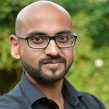
Dr Myron A Godinho
Scientia PhD Scholor - Developing and testing a framework for using Digital Health, Social Enterprise & Citizen Engagement in delivery of Integrated People-Centered Health Services
Mode of study :
Full-time
Country :
India
Previous Education :
Bachelor of Medicine / Bachelor of Surgery (MBBS)
Deciding to accept a PhD scholarship at a university that is ranked among the top 50 in the world, while working on globally relevant research at a WHO Collaborating Centre is a relatively easy decision to make. Having studied medicine, I’ve always been aware of the limits of a hospital-focused approach to health, leading me to pursue public health, which I like to think of as ‘everything to do with health outside of the hospital’. I enjoy using eclectic methodologies to solve diverse health problems – an approach well characterised by my PhD project, which is placed at an intersection of technology, economics, public policy, and (finally) health. Additionally, despite being out of the workforce during the 4-year period of my PhD, the Scientia Scholarship provides me with funding for career development, enabling me to participate in internships, ensuring that my professional growth remains on par with my academic progress.
Summary of research project
As public healthcare systems in developed nations seem to produce only limited gains in population health, policymakers are increasingly looking elsewhere for convincing solutions to improve population health. The world over, public health systems are notoriously underfunded, and precariously overloaded; the need for non-government actors to step in and fill the gaps in healthcare service delivery has been evident for a while. Integrated care brings together inputs, delivery, management and organization of services related to diagnosis, treatment, care, rehabilitation and health promotion, in order to create connectivity, alignment and collaboration within and between the cure and care sectors (on funding, administrative, organisational, service delivery and clinical levels), to ultimately improve services in relation to access, quality, user satisfaction and efficiency. Social enterprises also hold great promise in being able to meet human needs in both developed and developing nations, and many efforts are already underway in this regard. Social entrepreneurs involved in health service delivery are harnessing the capacity of digital health (including eHealth, mHealth, health informatics, etc) to improve service delivery, while also lowering the cost of care. Critically, this in turn enables those at the bottom of the economic pyramid (who were previously priced out of the market) to now have access to these essential services. Crucial to the design and delivery of effective services using a social enterprise business model and digital health, is robust Citizen Engagement, involving two-way communication in an iterative process of continuous improvement. This interdisciplinary project aims to develop a conceptual framework for utilising Social Enterprise, Digital Health, and Citizen Engagement to deliver Integrated, Patient-Centred Health Services. The project bridges the WHO Collaborating Centre for eHealth, and UNSW’s Yunus Social Business Health Hub (YSBHH).
Enjoyed most about research program
I’ve thoroughly enjoyed the enjoyed the support and flexibility offered by my PhD advisors, as well as the opportunities to contribute in the Digital Health-related work of the World Health Organization (Western Pacific Region) during my first semester itself. I attended an international conference where I gave an oral presentation on the WHO project, and am currently working towards publishing the work in a peer-reviewed, academic journal. I was also recently given the opportunity to participate in conducting a work experience program on Social Enterprise for High School students, and I look forward to the opportunity to begin teaching as well. Pursuing my interest in Global Health Policy, I was also given the opportunity to chair the Security Council at the Asia-Pacific Model United Nations 2018 Conference. Public Health is intrinsically interdisciplinary, offering unlimited opportunities for constructive collaboration with a diverse range of stakeholders, thus making it a thoroughly creative, exciting, and highly rewarding experience.
Message to newly commencing students
Attempt to make the best of every opportunity offered to you at UNSW – not just the academic ones – and there are plenty to go around. Join ARC and its associated societies and councils to meet those outside your conventional sphere of influence, and strike up some really interesting conversations with people from other disciplines. The Postgraduate Council is a good place to start. You’d be surprised how many truly interesting (academic ?) conversations start late in the evening over a few drinks…
How degree will assist in career
The PhD will provide me with a robust theoretical foundation to build upon in future work, as well as giving me a qualification that establishes my credibility as a dependable and creative thought-leader. As I aim to move into public health practice, the PhD will demonstrate my research proficiency in a field where research is a key aspect of progress, and hopefully contribute to my professional advancement.
- Publications
- Awards
- Grants
- Media
